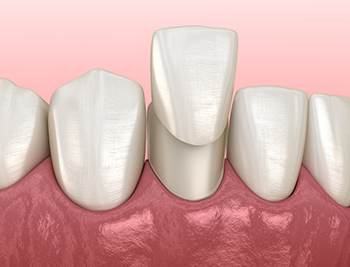If you’re like most people, you may be unhappy with the appearance of your smile. This is one of the primary reasons that cosmetic dentistry is so popular. This branch of dentistry allows people to make improvements to the appearance of their teeth, which can improve confidence.
There are procedures that fall in the category of cosmetic dentistry, one of the most popular ones is dental veneers.
In this article, we’ll explain more about what dental veneers are, their average life expectancy, factors that can impact how long your veneers last, and the options to replace veneers.
What are Dental Veneers?

Veneers are not permanent, as they will need to be replaced after some time. However, this is a somewhat invasive, non-reversible procedure. While the shells are thin, before they can be placed, some of the enamel will need to be scraped off of the teeth to create space for them. However, this is not a painful process.
There are two main types of veneers: porcelain and composite resin. Porcelain is the most natural-looking and longest-lasting. Composite resin is more budget-friendly and, with proper care and maintenance, can last a long time.
There is another option, no-prep veneers, which don’t require as much prep work to be done to the teeth. No-prep veneers resolve the same cosmetic concerns that porcelain or composite resin, but salvages as much of the tooth enamel as possible.
According to the American Dental Association, since dental veneers are a cosmetic dental procedure, most dental insurance providers will not cover it. On average, porcelain veneers range from a low of $925 to a high of $2,500 per tooth. Composite resin is on the lower end, ranging from $400 to $2,000 per tooth.
The cost depends on the type and brand of veneer, the cost of living in the area, and the dentist’s experience/expertise. If you live near a dental school, you may be able to save some money by allowing a student to do the work.
Average Lifespan of Dental Veneers
Typically, dental veneers last anywhere from 7 to 15 years. However, with proper care and maintenance, they may last 20 years or more.
Factors Affecting Veneer Lifespan
There are several factors involved in determining the lifespan of your dental veneers, including:
- Condition of your natural teeth prior to veneer placement
- Type of veneers you choose- research indicates that porcelain is the longest-lasting of the three types.
- Oral hygiene habits
- Playing contact sports
- Bruxism, or teeth grinding can put a lot of pressure on your veneers
- Use of teeth as tools
- Crunching on hard candies, nuts, or ice
- Tobacco use can damage veneers
- Dark foods/beverages
Signs Your Veneers Need to be Replaced
There are several signs that your dental veneers need to be replaced, including:
- Veneers are cracked/chipped or look worn down
- The tooth that is supporting the veneer is decayed, causing the veneer to separate from the tooth
- Poor oral hygiene and/or gum disease has caused the veneer to separate from the gums
- The wrong size veneers were applied the first time, or the veneers were not applied properly, which can be uncomfortable
Tips to Increase the Lifespan of Veneers
There are some things that you can do to increase the lifespan of your veneers:
First, you’ll want to make sure that you choose a dentist that has experience with veneers and understands the proper way to perform the procedure. In addition:
- Avoid using teeth as tools
- Avoid tobacco and foods/beverages that can stain the veneers
- Brush twice daily and floss at least once
- Visit the dentist every 6 months for a comprehensive exam and cleaning
- Avoid crunchy foods, as well as chewing on non-food items and crunching on ice or hard candy
- Use a nightguard if you grind your teeth while sleeping
- Use a mouthguard if you play contact sports
Replacement options for veneers
When your dental veneers need to be replaced due to wear and tear or damage, you will want to consider replacement options. Since veneers are separate, if you damage one, it is possible to replace it only. However, if your veneers are completely worn out, you may want to replace them all with a new set of veneers.
If a tooth underneath your veneers is damaged or decayed, you may want to consider root canal therapy along with a crown to salvage the structure of the tooth. If this is not possible, extraction may be the only option and you may want to consider a dental implant.
Enhance Your Smile with Dental Veneers
If you are unhappy with the appearance of your teeth, dental veneers might be the option that you are looking for. These thin shells can help disguise cracks, chips, discoloration, gaps, and the size of teeth.
However, it is important to note that this is a cosmetic procedure, and your dental insurance may not cover it. Our office staff will work with your provider to determine coverage. If you do not have insurance or your provider does not cover cosmetic dental procedures, most clinics do offer financing options that they can guide you through.
Ready for a Smile Upgrade? Contact Arlington Dental Excellence Today!
Don't let dental imperfections hold you back from smiling with confidence. At Arlington Dental Excellence in Arlington, VA, we offer high-quality dental veneers that can transform your smile in just a few visits. Our experienced and friendly dental team will work with you to create custom veneers that match your natural teeth and enhance your overall appearance. Book your appointment today to learn more about how dental veneers can improve your smile!




